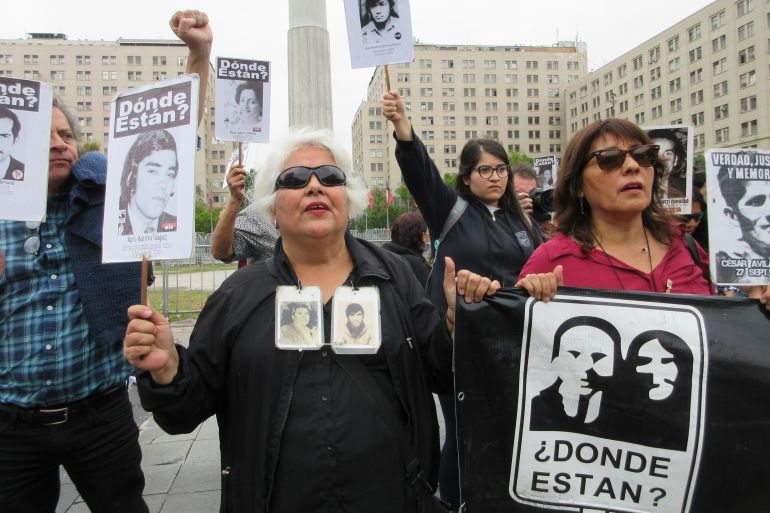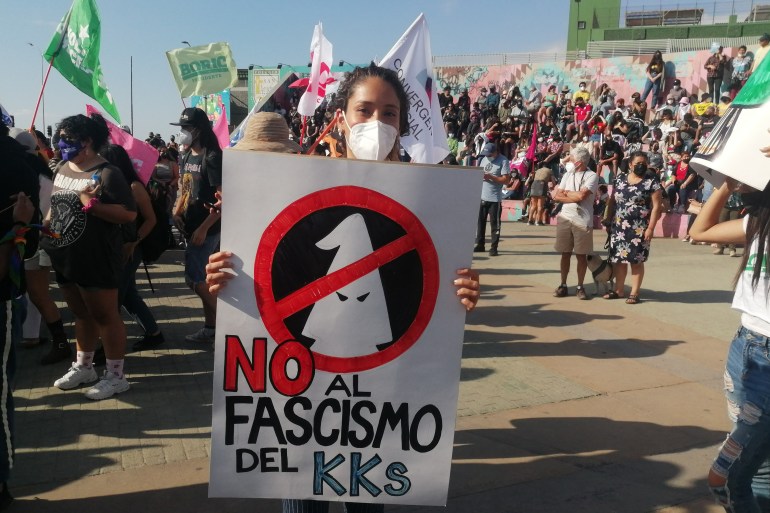‘Still a lot of pain’: Dictatorship victims haunt Chile election
Relatives of Pinochet victims raise alarm as dictatorship emerges as key issue in lead-up to Sunday presidential runoff.

Antofagasta, Chile – Samuel Burgos Espejo was just a child when soldiers killed his older brother, one of the victims of a 1973-1990 Chilean dictatorship that saw thousands of dissidents tortured, executed and forcibly disappeared.
“I was 11 years old when they killed my brother. I saw the death at the front door of my house,” Burgos Espejo, now 56, told Al Jazeera.
Keep reading
list of 3 itemsWomen in Chile voice fears over far-right presidential candidate
Chilean democracy faces a critical test
In 1973, a United States-backed military coup overthrew Chile’s elected socialist President Salvador Allende and swept General Augusto Pinochet to power. The Pinochet dictatorship ended more than 30 years ago, but many families of its victims are still seeking justice.
They have been sounding the alarm during Chile’s presidential election race, as the dictatorship emerged as an issue in the months leading up to Sunday’s runoff, with far-right candidate Jose Antonio Kast holding Pinochet in high esteem.
Burgos Espejo’s brother, Jose Gabriel Espejo Espejo, was in his early 20s when Pinochet took power. An active member of the Communist Youth in Tierra Amarilla, 800km (497 miles) north of the capital Santiago, he was under surveillance and was detained several times in the early years of the dictatorship.
Espejo Espejo was at a neighbour’s house late on the night he was killed. A military-enforced curfew was in force and soldiers on patrol detained him, took him outside and told him to walk home. They shot him in the back when he got to the front door of his family home.
“I heard the gunshot and got out of bed. My brother was on the ground, bleeding,” said Burgos Espejo, wearing a t-shirt with his brother’s photograph and the date he was killed: March 20, 1976. “There is still a lot of pain.”
Over 1,200 disappeared
For Burgos Espejo and many other Chileans, memories of the dictatorship have come to the forefront during the election campaign.
The runoff pits Kast, a far-right religious conservative, against Gabriel Boric, a progressive social democrat. The winner will take office on March 11 next year and likely face fierce opposition in a divided Congress.
Kast, a 55-year-old lawyer and former congressman, garnered more votes in the first-round election last month. Boric, a 35-year-old congressman and former student activist, subsequently led in the polls until a pre-election poll publication ban kicked in on December 5.
The electoral roll now acknowledges people forcibly disappeared during Pinochet’s rule.

While the dead cannot vote, when Chileans cast their ballots, the voters’ lists will include names of people detained and disappeared during Pinochet’s dictatorship with a note: “person absent due to enforced disappearance.”
The National Electoral Service, SERVEL, which implemented the move this year, said recognising the detained and disappeared on the electoral roll is an act of “civic memory”. More than 1,200 people, most of them political dissidents, were forcibly disappeared by the military during Pinochet’s rule.
Some of the disappeared were massacred and buried in the desert. Some were thrown from helicopters into the ocean. Some of the victims’ remains have been found, but most are still missing.
Burgos Espejo’s brother could have been one of them after he was shot, but he said when the military was taking him away, Burgos Espejo’s father climbed onto the truck and refused to get off. They went to the hospital, and after he was confirmed dead, a doctor stopped soldiers from removing his body from the hospital.
“It was obvious they wanted to disappear him like they did to so many victims,” Burgos Espejo said on Tuesday while waiting for Gabriel Boric’s arrival in the northern city of Antofagasta, where some supporters in the crowd held “No To Fascism” signs in reference to Kast.
Kast’s views
Kast has celebrated the violent 1973 coup, advocated on behalf of military officials convicted of crimes against humanity, and openly defended Pinochet’s regime, which he refers to as a “military government” – never a dictatorship.
He denied being a “Pinochetista” – a Pinochet supporter – ahead of last month’s election and walked back remarks minimising human rights violations, but opponents and journalists continue to question him about his long track record of pro-Pinochet remarks.
Kast’s family history also resurfaced during the campaign. He had always maintained that his German father was drafted into the military under Adolf Hitler but had nothing to do with Nazism. Earlier this month, a Chilean journalist uncovered Kast’s father’s Nazi Party ID card, which notes he joined at the age of 18 in 1942.
Kast has been making a concerted effort to present himself as a tolerant democrat. He also made some substantial changes to his platform following the first round but stands by some of the points that generated the most alarm.

Anti-communism and references to “agitators” and “terrorists” crop up repeatedly in Kast’s discourse. He has proposed South American intelligence cooperation that critics view as reminiscent of Operation Condor, a US-backed intelligence-sharing scheme in the 1970s and 1980s between South American dictatorships that they used to identify and assassinate political dissidents.
Kast also wants to broaden significantly the circumstances under which a president has the power to order preventative arrests and detention in undesignated locations. The current dictatorship-era constitution, which is in the process of being replaced, only grants that power in times of war.
‘Polarised’ landscape
Nevertheless, Kast’s primary focus on law and order has drawn support from many people concerned about crime, as well as others who want a stop to frequent protests.
The election is taking place in an altered political landscape following an explosion of social unrest in October 2019 that saw sustained mass protests. Demonstrators pointed not only to the deeply unpopular government of President Sebastian Pinera but to the last 30 years – and demanded structural change.
One of the outcomes of the political crisis has been the rejection of the traditional party coalitions that have governed since the end of the dictatorship in 1990. The centre-left and liberal-right candidates of those coalitions only garnered 11,6 percent and 12,8 percent of the votes last month, respectively.
“It was always two blocs and for various reasons they tended to move to the centre, to reach agreements,” said Ricardo Iglesias, head of the History Institute at the Pontifical Catholic University of Valparaiso. “Now, with a void in the political centre, the discussion is polarised.”

This is the first time in three decades that the dictatorship-democracy discussion has been an election issue, said Iglesias, adding that for many Chileans, though, it probably just does not resonate.
“It is not binary. It is not just dictatorship-democracy. It is not just order and security versus the discourse of the left. In the middle … there is a group of citizens young and old who are on the outside of that discussion. What they want is for their issues to be resolved,” Iglesias told Al Jazeera, pointing to inequality, jobs and gender, among other issues of importance.
“I think Boric tries to escape from that a bit,” he added. “Boric tries to have a discourse toward the future, but Kast’s discourse is to the past.”
Meanwhile, many families of the dictatorship’s victims are still seeking the whole truth of what happened, searching for the disappeared, and fighting for justice – and to them, Kast represents a dangerous return to the past.
“We want justice,” said Burgos Espejo. “How many mothers have died without ever knowing where their children are?”